
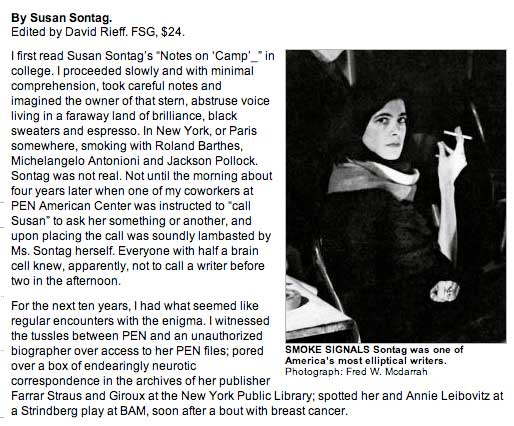
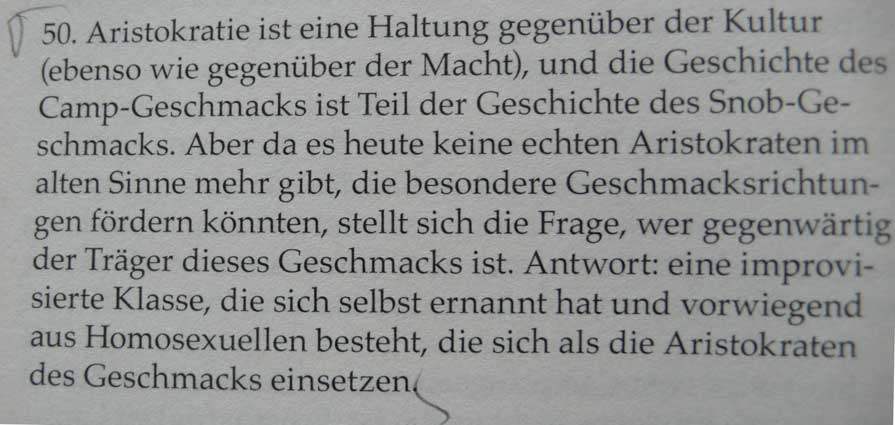
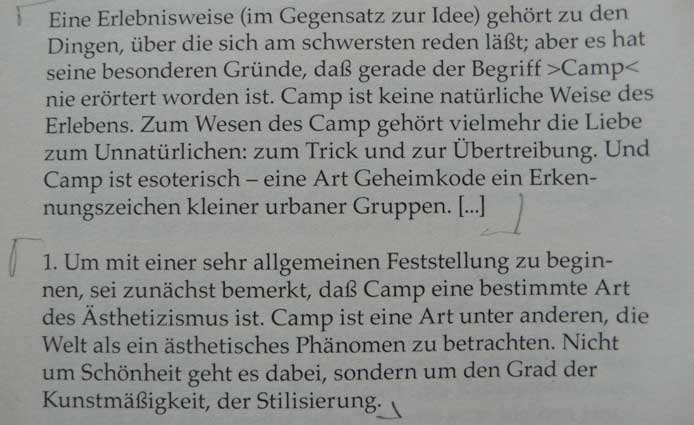
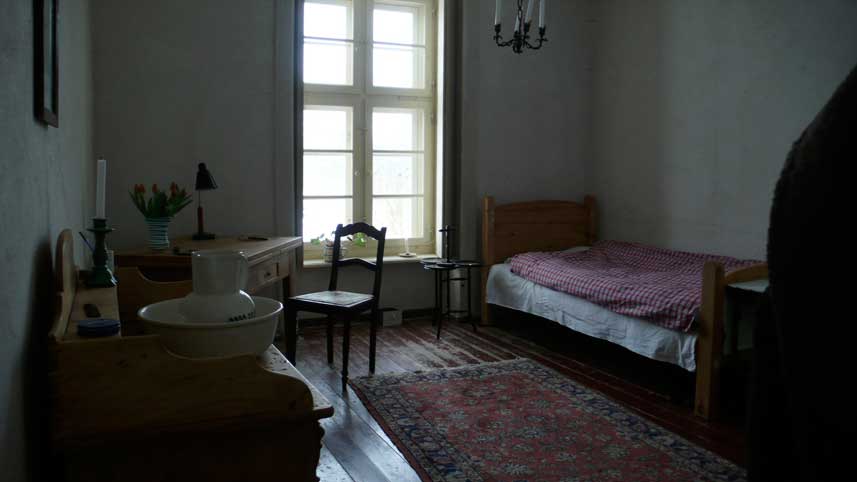
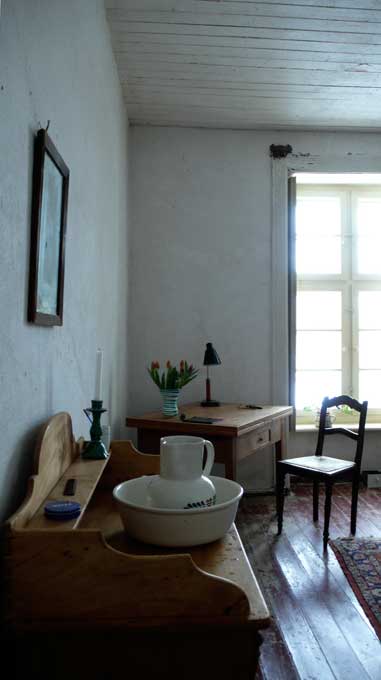

... thematisiert die Vernichtung einer Kulturlandschaft in Mitteldeutschland, nach 1945 sind ungeheure kulturelle Werte zerstört worden.

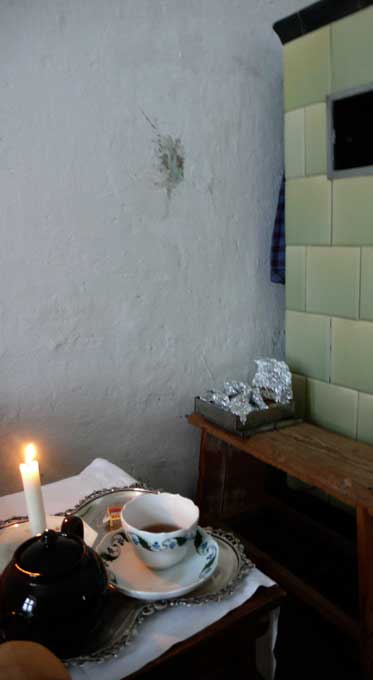





Die hier eingeschränkte Situation zur Zeit hält an. Kein Wasser, da die Pumpe nicht geht. Die Pumpe schlägt die Sicherung raus. Also Waschen, Teetrinken reduziert. Der Installateur sagt, es ist der Strom, der Elektirker...kommt übers Wochenende
Holz geht aus. Der kleine Raum neben der Küche hilft, früher das Zimmer der Mädchen. Vorne kalt. Computer in der Küche.
50. Aristocracy is a position vis-à-vis culture (as well as vis-à-vis power), and the history of Camp taste is part of the history of snob taste. But since no authentic aristocrats in the old sense exist today to sponsor special tastes, who is the bearer of this taste? Answer: an improvised self-elected class, mainly homosexuals, who constitute themselves as aristocrats of taste.
51. The peculiar relation between Camp taste and homosexuality has to be explained. While it's not true that Camp taste is homosexual taste, there is no doubt a peculiar affinity and overlap. Not all liberals are Jews, but Jews have shown a peculiar affinity for liberal and reformist causes. So, not all homosexuals have Camp taste. But homosexuals, by and large, constitute the vanguard -- and the most articulate audience -- of Camp. (The analogy is not frivolously chosen. Jews and homosexuals are the outstanding creative minorities in contemporary urban culture. Creative, that is, in the truest sense: they are creators of sensibilities. The two pioneering forces of modern sensibility are Jewish moral seriousness and homosexual aestheticism and irony.)
52. The reason for the flourishing of the aristocratic posture among homosexuals also seems to parallel the Jewish case. For every sensibility is self-serving to the group that promotes it. Jewish liberalism is a gesture of self-legitimization. So is Camp taste, which definitely has something propagandistic about it. Needless to say, the propaganda operates in exactly the opposite direction. The Jews pinned their hopes for integrating into modern society on promoting the moral sense. Homosexuals have pinned their integration into society on promoting the aesthetic sense. Camp is a solvent of morality. It neutralizes moral indignation, sponsors playfulness.
Notes On "Camp"
by Susan Sontag
Published in 1964.
Many things in the world have not been named; and many things, even if they have been named, have never been described. One of these is the sensibility -- unmistakably modern, a variant of sophistication but hardly identical with it -- that goes by the cult name of "Camp."
A sensibility (as distinct from an idea) is one of the hardest things to talk about; but there are special reasons why Camp, in particular, has never been discussed. It is not a natural mode of sensibility, if there be any such. Indeed the essence of Camp is its love of the unnatural: of artifice and exaggeration. And Camp is esoteric -- something of a private code, a badge of identity even, among small urban cliques. Apart from a lazy two-page sketch in Christopher Isherwood's novel The World in the Evening (1954), it has hardly broken into print. To talk about Camp is therefore to betray it. If the betrayal can be defended, it will be for the edification it provides, or the dignity of the conflict it resolves. For myself, I plead the goal of self-edification, and the goad of a sharp conflict in my own sensibility. I am strongly drawn to Camp, and almost as strongly offended by it. That is why I want to talk about it, and why I can. For no one who wholeheartedly shares in a given sensibility can analyze it; he can only, whatever his intention, exhibit it. To name a sensibility, to draw its contours and to recount its history, requires a deep sympathy modified by revulsion.
Though I am speaking about sensibility only -- and about a sensibility that, among other things, converts the serious into the frivolous -- these are grave matters. Most people think of sensibility or taste as the realm of purely subjective preferences, those mysterious attractions, mainly sensual, that have not been brought under the sovereignty of reason. They allow that considerations of taste play a part in their reactions to people and to works of art. But this attitude is naïve. And even worse. To patronize the faculty of taste is to patronize oneself. For taste governs every free -- as opposed to rote -- human response. Nothing is more decisive. There is taste in people, visual taste, taste in emotion - and there is taste in acts, taste in morality. Intelligence, as well, is really a kind of taste: taste in ideas. (One of the facts to be reckoned with is that taste tends to develop very unevenly. It's rare that the same person has good visual taste and good taste in people and taste in ideas.)